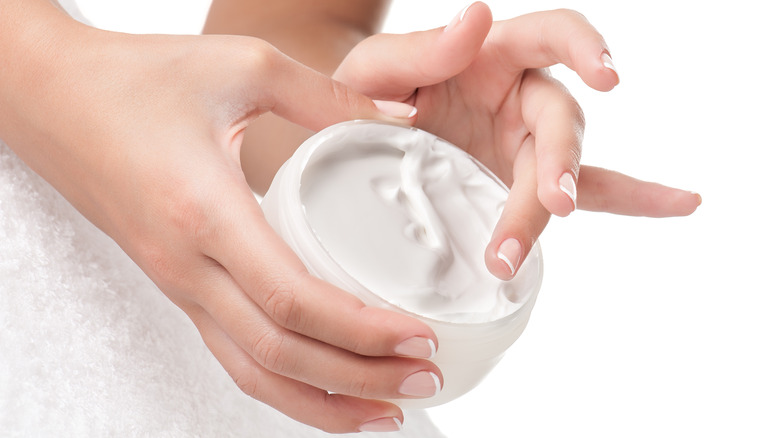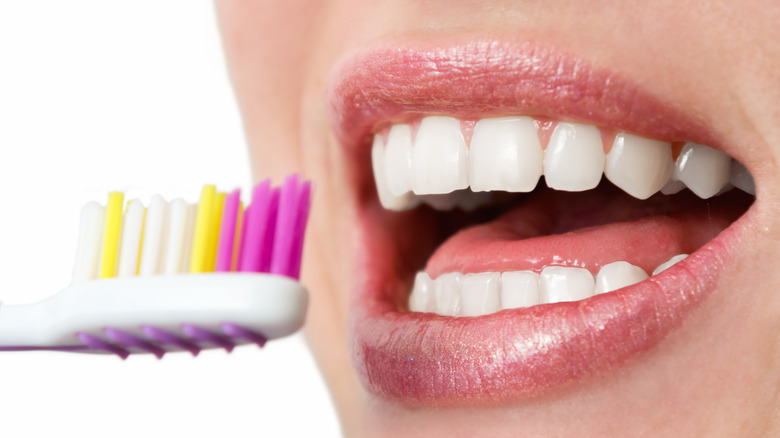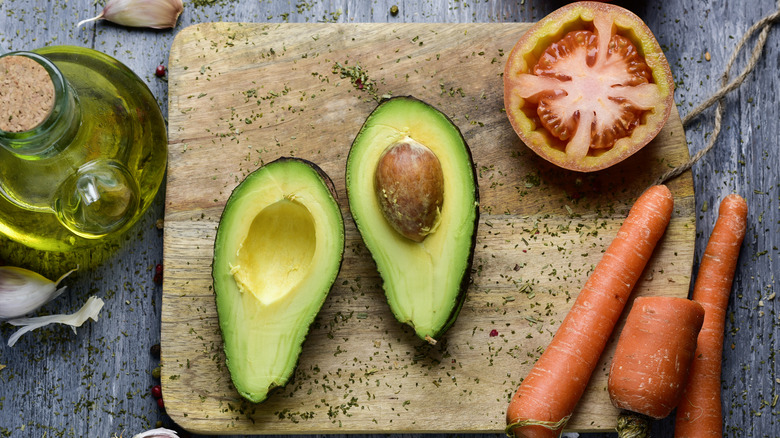These Are The Signs That You're Healthy
In the last ten years or so, I've become increasingly interested in health and wellness. In light of my own health issues, I've wanted to learn as much as I can about how to be as healthy as possible, and how I can assess my own health outside the doctor's office. As it turns out, though, there's a ton of conflicting information out there.
Some say weight and health are perfectly correlated, but others don't. There's a veritable cornucopia of opinions on what good digestive health looks like, and only a handful of those assessments line up in agreement. And let's not even get started on the issue of what constitutes a healthy diet!
In an effort to lock down some solid information, here's what physicians, researchers, and other folks in the know have to say when it comes to indicators of good health.
Full, lustrous hair
While brittle, dry, or thinning hair can be signs that something might be going awry (such as hypothyroidism, stress, or nutrient malabsorption), the reverse is also true: healthy hair is an indication of a healthy body. "Hair is a barometer of your overall health," says British Science Corporation in New York City's hair and scalp expert, David H. Kingsley, Ph.D.
"Good hair depends on the body's ability to construct a proper hair shaft, as well as the health of the skin and follicles," writes Today show health expert Joy Bauer, MS, RDN. "Good nutrition assures the best possible environment for building strong, lustrous hair." Nourished by key components of your diet like protein, vitamins, and healthy fats, healthy hair reflects that you're eating well and absorbing all the good stuff from your food.
Strong nails
Another window into your health is, one might say, right at your very fingertips: it's your nails! (Forgive the pun. As I gradually turn into my parents, my attempts to resist the allure of dad jokes is increasingly futile.) "Your nails are a very good reflection of your health. Many things can occur in the nails that can signify systemic or skin problems," says dermatologist Christine Poblete-Lopez, MD, of the Cleveland Clinic. According to Dr. Poblete-Lopez, just like stress can affect your hair, your nails can also reveal signs of strain on your body.
A pink nail bed without lines or discolorations, as well as strong nails without pitting, lines, or weakness, are all signs of good health. However, if your nails undergo changes like discoloration (whiteness or brown marks in the nail bed) or start to look pitted, it could be a sign that something is amiss. "Changes in the nails can be a sign of a local disease like a fungus infection or a sign of a systemic disease like lupus or anemia," according to Joshua Fox, MD, director of Advanced Dermatology and spokesman for the American Academy of Dermatology.
Healthy teeth and gums
Oral health is also a key barometer of health and wellness, according to the Mayo Clinic. Strong teeth and healthy, pink gums that aren't inflamed play a key role in staying healthy, as does proper oral hygiene.
Just like other areas of your body, such as your skin and intestines, your mouth is full of bacteria. While most of them are totally harmless or even beneficial, according to the Mayo Clinic, "Normally the body's natural defenses and good oral health care, such as daily brushing and flossing, can keep these bacteria under control. However, without proper oral hygiene, bacteria can reach levels that might lead to oral infections, such as tooth decay and gum disease."
It's also possible that those run-amok oral bacteria (bacteria gone wild?), along with the inflammation that accompanies a severe form of gum disease called periodontitis, may have a role in the development of other problems such as cardiovascular disease and, among women who are pregnant, issues like premature birth and low birth weight. Moral of the story: floss often (even though it's quite possibly *the* most onerous of hygiene tasks), and visit your dentist regularly.
Waist circumference
Happily, Body Mass Index (BMI) is falling out of favor as a means of measuring health. BMI, which measures weight relative to height and is often used to evaluate the amount of excess fat on a person's body, has long had its detractors, and those objections have picked up steam in recent years.
For example, a UCLA study published in the International Journal of Obesity noted that after examining how peoples' cardiac health correlated with their BMI, "Nearly half of overweight individuals, 29 percent of obese individuals and even 16 percent of obesity type 2/3 individuals were metabolically healthy. Moreover, over 30 percent of normal weight individuals were cardio-metabolically unhealthy."
Nowadays, physicians are leaning more towards waist circumference as a key health indicator, according to TIME. According to recent studies, accumulating fat in the abdomen poses a greater health risk than simply being overweight by BMI standards ─ in fact, a 2008 study indicated that even among people who were not considered to be overweight, a larger waist was correlated with a greater risk of early death. Research suggests that this may be because fat that accumulates in the midsection is more metabolically active than fat that sits beneath the skin, so it secretes hormones and other cells that affect the body's biochemistry. Even in people whose BMI is normal, "having a large waist may mean that they are at higher risk of health problems than someone with a trim waist," according to the Harvard School of Public Health.
You get enough sleep
We all know how not getting enough sleep is ─ to put it mildly ─ absolutely wretched. According to the UK's National Health Service (NHS), lack of sleep puts people at higher risk of all sorts of less-than-fun conditions such as diabetes, weight gain, and heart disease, and can even decrease a person's life expectancy. As the NHS states, "It's now clear that a solid night's sleep is essential for a long and healthy life."
Even though researchers haven't yet fully grasped why we sleep, Harvard Medical School's Division of Sleep Medicine notes that "scientists have gone to great lengths to fully understand sleep's benefits. In studies of humans and other animals, they have discovered that sleep plays a critical role in immune function, metabolism, memory, learning, and other vital functions."
One theory that has gained a great deal of traction and support recently is that sleep is a restorative process which allows the body to repair and rejuvenate itself. "The most striking of these is that animals deprived entirely of sleep lose all immune function and die in just a matter of weeks," writes Harvard's sleep medicine program. "This is further supported by findings that many of the major restorative functions in the body like muscle growth, tissue repair, protein synthesis, and growth hormone release occur mostly, or in some cases only, during sleep." So, needless to say, getting enough sleep ─ and feeling well-rested, rejuvenated, and energized when you wake up ─ is a sign of good health.
Let's talk about poo
Ok, so this one is super awkward — but it's also super important. As Dr. Vasudha Dhar, a gastroenterologist writing for Everyday Health, so accurately notes, "There really is no easier way to discover what's happening inside your body than seeing what comes out of it." So, bear with me on this one!
According to Dhar, there's a wide range of "normal" bowel movements. Despite what various blogs or famous TV doctors say, you don't need to go once a day (or have a perfectly-shaped poo, or have stool that doesn't stink) in order for it to be within the range of normalcy. "Everyone's GI tract operates differently based on a combination of constant and changing factors ─ genetics, hydration, dietary habits, medication use, and ongoing health issues," Dhar writes. Instead of worrying about whether or not your poo meets these purportedly ideal criteria, focus on "how your GI tract normally functions and what typical bowel activity is for you. If you notice a prolonged change, that's when you need to closely monitor what's happening. In addition, if you are feeling pain or other pronounced symptoms, it's time to call your doctor." Some symptoms to look out for include visible blood, continual constipation, or prolonged diarrhea.
Social support
Some of the most interesting research to come out recently has shown that having friends, a strong social support network, and opportunities for interaction are all profoundly good for you. It seems obvious that this would impact mental health, but research is showing that it affects physical health, too.
According to a study published in the Journal of Health and Social Behavior, people with more social connections are "healthier, and live longer, than their more isolated peers." Among other key findings, the study found that not only do social relationships have a significant impact on health, but that those connections and relationships affect behavioral, mental, and physical health. Basically, no aspect of a person's health goes untouched by their degree of isolation and loneliness — or, conversely, their social connections, friendships, and healthy relationships.
This begs the question: why do social connections have such a profound impact on overall health? According to the Harvard Women's Health Watch newsletter, social connectivity "helps relieve harmful levels of stress, which can adversely affect coronary arteries, gut function, insulin regulation, and the immune system. Another line of research suggests that caring behaviors trigger the release of stress-reducing hormones...research has also identified a range of activities that qualify as social support, from offers of help or advice to expressions of affection. In addition, evidence suggests that the life-enhancing effects of social support extend to giver as well as to receiver." So, having friends is good for you.
An often-overlooked sign: your tongue
Melanie St. Ours, a Baltimore-based clinical herbalist, wrote a piece for MindBodyGreen detailing how the Chinese Medicine-inspired practice of tongue reading can be a great barometer of health and wellness. I also had the chance to speak to her directly, and she told me: "It's not a substitute for medical diagnosis, but if you want to get a sense of how well you're digesting last night's dinner, or how your body is handling stress, your tongue can tell you a lot."
She elaborated in her article that if the tip of your tongue is red, for example, it's a sign that your heart, mind, and emotions are revved up. She wrote: a red tip often "accompanies symptoms like insomnia, palpitations, nervousness, and an unquiet mind." Other tongue signs include a thick coating ─ particularly towards the back ─ which signals that your digestion isn't performing optimally, and teeth marks on the sides of the tongue, which "point to low energy, sluggish digestion, loose stools, and mental rumination."
St. Ours encourages people to let their tongue readings guide them toward positive changes. "Let your tongue reading inspire you to make the necessary shifts so that you can thrive," she wrote. "Then, enjoy watching your tongue change in response to your new healthy habits!"
Your diet includes lots of fruits, veggies, and healthy fats
While there tends to be all sorts of angst and competition surrounding how to eat healthily (e.g., the vegan vs. paleo sectarian tension, orthorexia, "clean" eating, etc.), one thing everyone can agree on is the importance of fruits, veggies, and healthy fats.
According to the Harvard School of Public Health (HSPH), regularly eating your fruits and veggies "can lower blood pressure, reduce risk of heart disease and stroke, prevent some types of cancer, lower risk of eye and digestive problems, and have a positive effect upon blood sugar." Variety and quantity are equally important, HSPH notes, because each piece of produce is different; "no single fruit or vegetable provides all the nutrients you need to be healthy." So, it's important to eat a wide variety of produce, with as many different colors as possible, each day. (Think "taste the rainbow," but with things like apples, carrots, and purple cabbage, instead of Skittles.)
If totally overhauling your diet seems way too overwhelming, there's some good news: according to TIME, a recent study has shown that just adding more healthy foods to your diet — even over the course of years, as opposed to the radical overhaul of your diet in days or weeks — can have a positive impact on health and longevity. So, no need to clean out and replace all the food in your house — just adding some fruits and veggies to your day can make a big difference.
You have normal vital signs and fitness levels
While I've spent many an hour going down the rabbit hole of fitness tips on Instagram ─ there's a tipping point where I go from feeling inspired ("Ok, I can do this!") to feeling discouraged ("Noooope, my knees ache just thinking about those exercises") ─ it turns out you don't have to be an Insta-worthy fitness expert in order to be considered healthy.
According to the BBC, basic fitness guidelines include "30 minutes of moderate exercise at least five times a week." Doctors also look at whether a person has a "reasonable level of fitness," which includes things like being able to "walk a mile in 15 minutes," carry two shopping bags from the store to the car, and climb a flight of stairs without getting winded.
Furthermore, having normal vital signs is, well, vital. By looking at a person's blood pressure, heart rate, and respiratory rate, health care providers can get a good sense of how well your insides are working. As published in the BBC report, normal, healthy vital signs include "blood pressure below 140/90 mmHg each time it is taken, a resting pulse of about 70 beats per minute, and a respiratory rate of about 16 to 20 breaths per minute."
You pay attention to your mental and emotional health
Proactively managing your mental and emotional health is another key sign of being healthy, especially since, according to the U.S. government's Office of Disease Prevention and Health Promotion (ODPHP), "Mental health and physical health are inextricably linked. Evidence has shown that mental health disorders ─ most often depression ─ are strongly associated with the risk, occurrence, management, progression, and outcome of serious chronic diseases and health conditions, including diabetes, hypertension, stroke, heart disease, and cancer."
Furthermore, explains David Goldberg, a professor at the Institute of Psychiatry in London, "Depression and chronic physical illness are in reciprocal relationship with one another: not only do many chronic illnesses cause higher rates of depression, but depression has been shown to antedate some chronic physical illnesses."
While the reciprocal relationship is mostly talked about in the context of illness, it also holds true when it comes to health. By nurturing your mental and emotional well-being, you're also improving your physical health. Supporting your mental health ─ especially if you incorporate exercise, stress management (such as meditation, deep breathing, or yoga), and working with a qualified therapist into your mental health routine ─ helps keep the rest of you healthy, too.
To your health!
One thing that people often find when trying to make healthy changes is that it can all feel totally overwhelming. (Overhaul your diet! Exercise every day! Eliminate sugar! Go to bed early! Hustle! Grind! No excuses! Oh, and be sure to relax!)
But, if you find that you want, or need, to make some changes, it's okay to take things slowly. Adding in a few things that you feel good about, whether it's a piece of fruit with lunch, an afternoon walk, or calling a friend for support, can actually go a long way. Doing the best you can with the circumstances and resources that you have is, in fact, a huge victory! (Gold star stickers are optional, but I fully support grown-ups using them just as much as kids do.)











